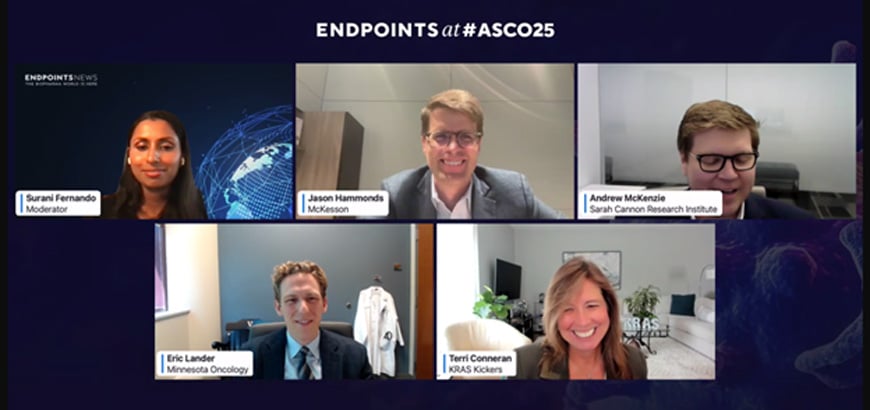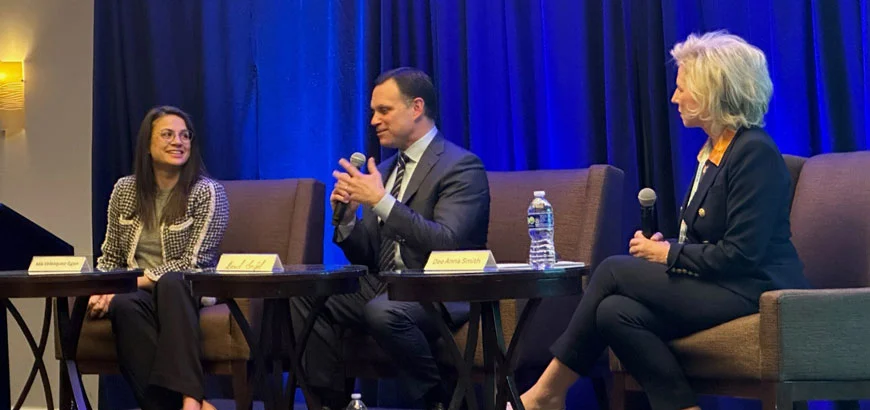Read time: 4 minutes
Precision medicine has revolutionized cancer care, ushering in an era of targeted therapies and personalized insights for patients.
When Terri Conneran received the results of genomic testing and learned about her KRAS mutation diagnosis, it was an ‘a-ha moment’ in her lung cancer journey. The cancer survivor, patient advocate and founder of KRAS Kickers says, “Patients need to know their biomarkers to build a strategic, intentional plan of action.” This insight captures the essence of what precision medicine can offer: clarity, empowerment and a path forward in cancer care.
At this year’s American Society of Clinical Oncology (ASCO) Meeting, Endpoints News, a leading biopharma and healthcare publication, hosted a live panel discussion on how community practices can leverage technology to seamlessly integrate precision medicine into daily workflows.
Below are highlights from this moderated discussion.

Empowering community oncology practices to lead the precision medicine revolution
Community oncology plays a pivotal role in the adoption and delivery of precision medicine, as approximately 85% of patients receive treatment in the community setting. Yet with the influx of data and resources come new challenges of adoption and access, especially for community oncology sites which often serve diverse patient populations in rural and underserved areas. These challenges can include the high cost of advanced diagnostic tools, insufficient technical support and low clinical trial enrollment.
“In community oncology, many of us are tasked with seeing patients of all tumor types. I’m a GI medical oncologist, but as I run our research program, I must review studies across all tumor types, which necessitates being up to date with all new information,” said Dr. Eric Lander, medical oncologist & hematologist, Minnesota Oncology. “As clinicians, we face the challenge of balancing the latest novel precision drugs and research pipelines while ensuring we’re delivering the best care to all patients.”
Leveraging digital enablement to unlock precision medicine in community oncology settings
Combining innovative technology with customized workflows and continuous education may help alleviate these challenges. Panelists shared how empowering community-based practices with technological solutions is crucial to the continued delivery of consistent, quality patient care within an evolving landscape.
“When designing technology tools, our overarching principle is to start with the end user. Through our partnership with The US Oncology Network and Sarah Cannon Research Institute, we can co-develop tools with our frontline clinicians, keeping their challenges top of mind and gathering feedback along the way,” said Jason Hammonds, chief operating officer, Oncology & Specialty, McKesson.
Seamlessly integrating clinical and administrative digital tools, such as Ontada’s point of care solution and market-leading EHR iKnowMedSM, equips providers with biomarker ordering guides and test results within their existing workflow. This ensures that staff have enhanced clinical decision support for precision medicine initiatives, allowing for more timely treatment decisions.
McKesson recently launched Precision Care Companion (PCC), a consortium designed to help community practices transition to more biomarker-driven cancer care. These resources are tailored to individual practice needs and include education, best practices and analytics on biomarker testing rates.
Harnessing technology can simplify and improve clinical research operations from start to finish. McKesson’s Genospace platform leverages patient matching algorithms to identify the right patient for each clinical trial, meeting patients at the right moment in their care journeys.
Putting patients at the center of digital transformation to improve care
“Technology is critical and our ability to use the newest technologies is important for our future success, but it’s half of the equation,” explained Andrew McKenzie, PhD, Vice President, Personalized Medicine, Sarah Cannon Research Institute; Scientific Director, Genospace.“The other half is layering in the support systems, human interactions and interventions, so that we can extract the most valuable information from this data-rich environment. Technology plus services is where we have seen the largest impact to the patients that we’re serving.”
At McKesson, we are dedicated to strengthening community oncology, ensuring every patient has access to high-quality cancer care, close to home. Through our partnership with Sarah Cannon Research Institute—connecting more than 1,300 physicians at more than 200 locations in 20 states—we eliminate barriers to research, enabling patients to access clinical trials without traveling to large academic centers. By prioritizing patient education and building trust, practices ensure that those patients most affected by a disease can access cutting-edge trials within their own communities. This patient-centric approach is at the heart of our digital transformation, driving us to create a more accessible, equitable and compassionate cancer care ecosystem.
Read a featured post about the discussion on the Endpoints News website. In case you missed it, you can view the on-demand video recording.




Share
Post
Post
Email